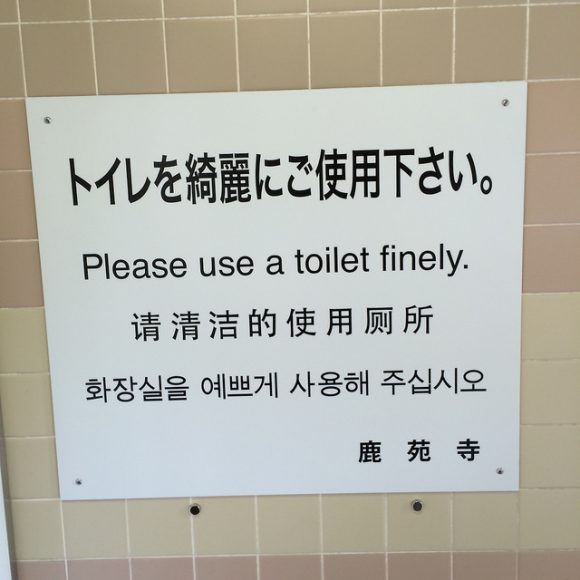
“Westerner in Japan = Fluent English speaker.” Is this axiom really true?
YouTuber That Japanese Man Yuta always delivers the goods when it comes to testing out theories about Japanese society. He’s also particularly sensitive to the specific experiences of foreign residents, and through his series of street interviews, we’ve been able to learn a lot more about what Japanese people really think.
His most recent video, “Do foreigners in Japan really speak English?” sees Yuta and pals take to the streets of Shibuya to see how many visibly Western foreigners know conversational English. The aim of the video is to test the hypothesis, widely taken as fact in Japan, that “Westerners = English speakers.”
Let’s check out the video!
Every single person was either a native English speaker or a speaker of English as a second language.
As we’ve discussed before, some foreigners in Japan don’t like it when Japanese people speak English to them. In fact, some even get offended. Nobody likes to be pigeonholed or categorised, and it’s easy enough to become frustrated when you’ve lived and worked in Japan for many years and speak the language fluently, and you’re constantly faced with well-meaning Japanese persons who address you in English, especially when they don’t even speak decent English. This usually only crosses into obnoxious territory in the case of Gaijin Hunters/English Vampires, who will stubbornly persist in speaking English to you even when it’s obvious you speak much better Japanese than they do English.
▼ Engrish: it’s probably better than nothing
Certain stereotypes stubbornly pervade the Japanese consciousness, with axioms such as “foreigners can’t speak Japanese” and “all Westerners basically speak English” being taken as fact. Sometimes, this idea is so ingrained in people’s psyches that it cannot be overridden, even in the face of clear evidence to the contrary.
Generally, however, speaking English to westerners in Japan is done as an act of politeness, carried out with the best intentions.
And, there’s actual validity to this way of thinking. First, Japanese is a Category 5 language, which means it takes around 88 weeks of study to achieve fluency for a native English speaker, far more than any European language. Attaining fluency in Japanese is no mean feat, and something that many foreigners, even ones who’ve spent years in Japan, struggle to master.
Secondly, all Japanese people study English as a second language at school (whether or not the teaching is actually effective is another matter), whereas in native-English speaking countries, people usually learn European languages (and in Europe, they learn English), rather than Japanese.
Finally, English is a global language, with the third highest worldwide rate of native speakers. What’s more, speakers of English as a second language are estimated to exceed 1 billion.
So, isn’t it possible that Japanese people who automatically assume that their (at minimum) high-school level English is the best way to communicate with a “visible foreigner” are simply making the most logical deduction, rather than being racist or exclusionary?
Source and screenshots That Japanese Man Yuta


 Westerners in Japan – Can they speak Japanese?【Video】
Westerners in Japan – Can they speak Japanese?【Video】 Japanese people give their thoughts on Gaijin Hunters/English Vampires
Japanese people give their thoughts on Gaijin Hunters/English Vampires Asian foreigners give their thoughts on what life is like being Asian in Japan
Asian foreigners give their thoughts on what life is like being Asian in Japan Japanese people react to “But we’re speaking Japanese!” video, and it’s kind of stunning
Japanese people react to “But we’re speaking Japanese!” video, and it’s kind of stunning English language education in Japan: Are native speakers essential?
English language education in Japan: Are native speakers essential? Family Mart’s Shibuya Cat Street shop hosts first-ever rescue cat photo exhibition for Cat Day
Family Mart’s Shibuya Cat Street shop hosts first-ever rescue cat photo exhibition for Cat Day Ghibli’s Kiki’s Delivery Service returns to theaters with first-ever IMAX screenings and remaster
Ghibli’s Kiki’s Delivery Service returns to theaters with first-ever IMAX screenings and remaster Survey finds that one in five high schoolers don’t know who music legend Masaharu Fukuyama is
Survey finds that one in five high schoolers don’t know who music legend Masaharu Fukuyama is Feast your eyes on yet more adorable 8-bit GIFs depicting daily life in Japan
Feast your eyes on yet more adorable 8-bit GIFs depicting daily life in Japan Japan has only one airport named after a samurai, so let’s check out Kochi Ryoma【Photos】
Japan has only one airport named after a samurai, so let’s check out Kochi Ryoma【Photos】 New Japanese menstrual product seeks to help women spot unidentified iron deficiencies
New Japanese menstrual product seeks to help women spot unidentified iron deficiencies Sega’s Like a Dragon yakuza teaches “useless” English, let’s use it to learn some useful Japanese
Sega’s Like a Dragon yakuza teaches “useless” English, let’s use it to learn some useful Japanese Awesome Japanese rice porridge bread is just about the easiest thing to make in the world【Photos】
Awesome Japanese rice porridge bread is just about the easiest thing to make in the world【Photos】 Japan’s new luxury sightseeing train will show you part of the country most foreigners never see
Japan’s new luxury sightseeing train will show you part of the country most foreigners never see 7-Eleven Japan’s sakura sweets season is underway right now!
7-Eleven Japan’s sakura sweets season is underway right now! The 10 most annoying things foreign tourists do on Japanese trains, according to locals
The 10 most annoying things foreign tourists do on Japanese trains, according to locals Starbucks Japan releases new sakura goods and drinkware for cherry blossom season 2026
Starbucks Japan releases new sakura goods and drinkware for cherry blossom season 2026 Is Sapporio’s Snow Festival awesome enough to be worth visiting even if you hate the snow? [Pics]
Is Sapporio’s Snow Festival awesome enough to be worth visiting even if you hate the snow? [Pics] Japan has trams that say “sorry” while they ride around town…but why?
Japan has trams that say “sorry” while they ride around town…but why? Tokyo Skytree turns pink for the cherry blossom season
Tokyo Skytree turns pink for the cherry blossom season Highest Starbucks in Japan set to open this spring in the Tokyo sky
Highest Starbucks in Japan set to open this spring in the Tokyo sky Japan’s new “Cunte” contact lenses aren’t pronounced like you’re probably thinking they are
Japan’s new “Cunte” contact lenses aren’t pronounced like you’re probably thinking they are Shibuya Station’s Hachiko Gate and Yamanote Line stairway locations change next month
Shibuya Station’s Hachiko Gate and Yamanote Line stairway locations change next month Yakuzen ramen restaurant in Tokyo is very different to a yakuza ramen restaurant
Yakuzen ramen restaurant in Tokyo is very different to a yakuza ramen restaurant Starbucks Japan adds new sakura Frappuccino and cherry blossom drinks to the menu
Starbucks Japan adds new sakura Frappuccino and cherry blossom drinks to the menu Japan’s newest Shinkansen has no seats…or passengers [Video]
Japan’s newest Shinkansen has no seats…or passengers [Video] Foreigners accounting for over 80 percent of off-course skiers needing rescue in Japan’s Hokkaido
Foreigners accounting for over 80 percent of off-course skiers needing rescue in Japan’s Hokkaido Super-salty pizza sends six kids to the hospital in Japan, linguistics blamed
Super-salty pizza sends six kids to the hospital in Japan, linguistics blamed Starbucks Japan unveils new sakura Frappuccino for cherry blossom season 2026
Starbucks Japan unveils new sakura Frappuccino for cherry blossom season 2026 Foreign tourists in Japan will get free Shinkansen tickets to promote regional tourism
Foreign tourists in Japan will get free Shinkansen tickets to promote regional tourism Take a trip to Japan’s Dododo Land, the most irritating place on Earth
Take a trip to Japan’s Dododo Land, the most irritating place on Earth Naruto and Converse team up for new line of shinobi sneakers[Photos]
Naruto and Converse team up for new line of shinobi sneakers[Photos] Is China’s don’t-go-to-Japan warning affecting the lines at a popular Tokyo gyukatsu restaurant?
Is China’s don’t-go-to-Japan warning affecting the lines at a popular Tokyo gyukatsu restaurant? Survey asks foreign tourists what bothered them in Japan, more than half gave same answer
Survey asks foreign tourists what bothered them in Japan, more than half gave same answer Japan’s human washing machines will go on sale to general public, demos to be held in Tokyo
Japan’s human washing machines will go on sale to general public, demos to be held in Tokyo Starbucks Japan releases new drinkware and goods for Valentine’s Day
Starbucks Japan releases new drinkware and goods for Valentine’s Day We deeply regret going into this tunnel on our walk in the mountains of Japan
We deeply regret going into this tunnel on our walk in the mountains of Japan Studio Ghibli releases Kodama forest spirits from Princess Mononoke to light up your home
Studio Ghibli releases Kodama forest spirits from Princess Mononoke to light up your home Major Japanese hotel chain says reservations via overseas booking sites may not be valid
Major Japanese hotel chain says reservations via overseas booking sites may not be valid Put sesame oil in your coffee? Japanese maker says it’s the best way to start your day【Taste test】
Put sesame oil in your coffee? Japanese maker says it’s the best way to start your day【Taste test】 No more using real katana for tourism activities, Japan’s National Police Agency says
No more using real katana for tourism activities, Japan’s National Police Agency says Getting stopped by the police in Japan – how often does it happen (and why?)
Getting stopped by the police in Japan – how often does it happen (and why?) How to respond to Japanese people saying “I don’t speak English” when you’re speaking Japanese?
How to respond to Japanese people saying “I don’t speak English” when you’re speaking Japanese? 10 cringeworthy habits of English-speaking Japanese
10 cringeworthy habits of English-speaking Japanese Nihon-no: Is an entirely English-speaking village coming to Tokyo?
Nihon-no: Is an entirely English-speaking village coming to Tokyo? Over half of Japanese students in nationwide test score zero percent in English speaking section
Over half of Japanese students in nationwide test score zero percent in English speaking section What do Japanese people think of Black- and Asian-Americans?【Video】
What do Japanese people think of Black- and Asian-Americans?【Video】 Japanese people react to “weeaboo cringe videos” on YouTube【Video】
Japanese people react to “weeaboo cringe videos” on YouTube【Video】 Do Japanese people kiss in Public? 【Interview】
Do Japanese people kiss in Public? 【Interview】 Pronunciation anxiety: many Japanese people don’t want to speak English unless it’s “perfect”
Pronunciation anxiety: many Japanese people don’t want to speak English unless it’s “perfect” English-speaking-only bar opens in Osaka and Tokyo, yellow cards for those who don’t follow rules
English-speaking-only bar opens in Osaka and Tokyo, yellow cards for those who don’t follow rules Sneak attack English! Expat in Japan gets a nice surprise at the McDonald’s drive-thru
Sneak attack English! Expat in Japan gets a nice surprise at the McDonald’s drive-thru Japanese mayor suddenly speaks fluent English with AI video that surprises even him
Japanese mayor suddenly speaks fluent English with AI video that surprises even him Japan reaches its lowest-ever ranking on Education First’s 2024 English Proficiency Index
Japan reaches its lowest-ever ranking on Education First’s 2024 English Proficiency Index Do Japanese People Want Refugees in Japan?【VIDEO】
Do Japanese People Want Refugees in Japan?【VIDEO】 Five awkward moments that prove you’ve finally nailed that whole “living in Japan” thing
Five awkward moments that prove you’ve finally nailed that whole “living in Japan” thing